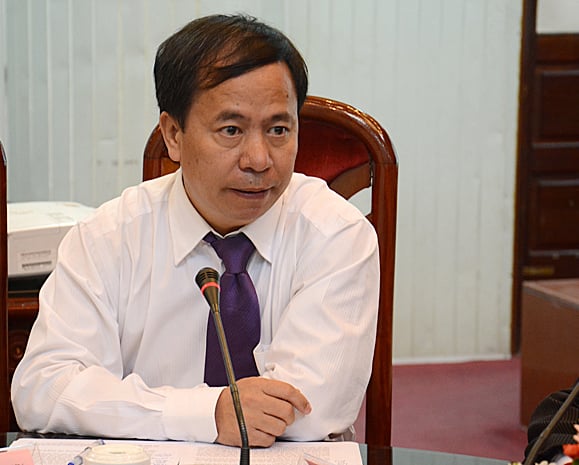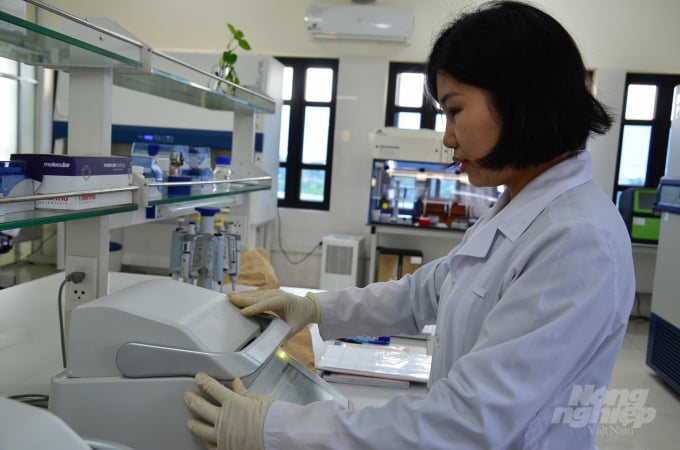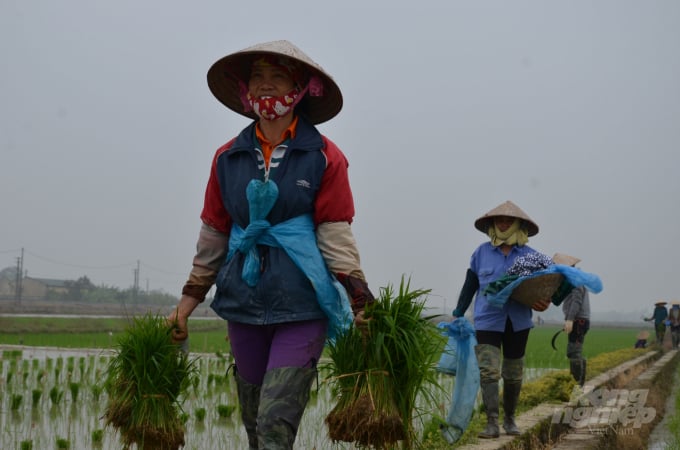June 23, 2025 | 00:02 GMT +7
June 23, 2025 | 00:02 GMT +7
Hotline: 0913.378.918
June 23, 2025 | 00:02 GMT +7
Hotline: 0913.378.918

Prof. Nguyen Hong Son, Director of the Vietnam Academy of Agricultural Sciences (VAAS). Photo: NVCC.
"Persisting on applying this Decree (Decree No. 70/2018/ND-CP) may easily make our fellow scientists feel discouraged and unable to develop good products", said Prof. Nguyen Hong Son, Director of the Vietnam Academy of Agricultural Sciences Nam (VAAS), opening the conversation.
"I once asked the group of authors who construct the Decree, ‘What type of property is this? Are they fixed assets, training assets, intellectual property, or are they of other types? You must be very specific.’ The reply I received was that they had to wait for the guiding circular of the Ministry of Science and Technology in order to have a clear format," Prof. Nguyen Hong Son said.
According to the implementation guidance of Decree No. 08/2014/ND-CP detailing a number of articles of the Law on Science and Technology, science and technology products include type I (sample, model, maquette, products, materials, equipment, machinery, technological lines, plant varieties, livestock breeds and others), type II (application principles, methods, standards, regulations, computer software, drawings, reports, etc.), and type III (articles, monographs).
Thus, because there is no guiding circular, the organization and implementation of Decree No. 70 still face many obstacles, particularly since the important ones are product types identification and asset valuation. The current scientific tasks receiving state supports are often those that businesses cannot yet replace public research institutes to perform.
Many enterprises have established seed research and development departments, but in reality, successes can only be seen in small numbers. They still have to cooperate with state research institutes to buy copyrights or use imported varieties.

Prof. Nguyen Hong Son going into the field to check the rice plants. Photo: NVCC.
"Regarding the practical situation of ‘asset valuation is the result of science and technology tasks funded and supported by the state budget’, we have found that the results of type I is only at the laboratory scale, or just assessment, testing and experiment on a narrow scale, which has not yet met production and commercial conditions as prescribed by the law.
“Determining their commercial value is not simple because there is not enough data except for some products such as plant varieties that have been recognized or announced for circulation. Moreover, for commercialization to occur, more investment in time, effort, intelligence and funding are required to develop the market and bring out products on a commodity scale," said Prof. Dr. Nguyen Hong Son, issuing the problem.

Laboratory of the Maize Research Institute. Photo: Duong Dinh Tuong.
There have been many models of joint transfer and sharing of copyright for some plant varieties between research institutes and enterprises at present, but it is difficult to determine the price. Neither the author nor the business themselves knows the true value of the product. The product’s true value will be "materialized" into the cost if fully calculated. The selling price would be too high that farmers cannot benefit from the product.
In the case of the rice variety OM5451, if both the Mekong Delta Rice Research Institute (the research unit) and the Loc Troi Group (the transferee) can fully exploit the author rights, the proceeds would be massive, possibly equivalent to the research funding of the entire Vietnam Academy of Agricultural Sciences.
Both the institute and the enterprise in reality only received a very small amount of money, unable to collect author rights fees for most of the seeds self-produced by cooperatives and farmers.
"The Mekong Delta Rice Research Institute in the past had an author rights fee of VND 100-200/kg of rice seeds, which is insignificant compared to the benefits it brings to society. Similarly, now most varieties of fruit trees and industrial plants propagated in the form of asexuality do not have a unit responsible for the copyright transfer because it is easy to lose. In this case, of course, farmers will benefit. Thus, if the State does not recover the invested capital, the first beneficiary will be the farmer, which can be considered as ‘one man’s loss is another man's gain’.
“Perhaps public research institutions still have great functions and duties up to this point. The state should continue to order science and technology tasks so that farmers can quickly get access and apply them into production."
Prof. Nguyen Hong Son
According to current regulations, scientific organizations, when transferring products created from state-supported budget sources, must pay taxes on corporate income. Therefore, the State should continue to assign scientific products to scientific organizations for management, exploitation and use. The unit can further add the development fund’s deductions to offset the annual support budget or improve the capacity of public scientific institutions if necessary.
It seems impossible to determine the commercial value for the case of research results in type II and type III. Most of the technological and technical processes are being transferred to farmers and cooperatives free of charge, so the funds are hardly recovered.
Many organizations and individuals think it is necessary to re-study the provisions of Decree No. 70 to ensure feasibility and at the same time create motivation so that organizations and scientists have more high-quality products.
Mechanisms should be created as open as possible to encourage researchers to create more excellent varieties, not to discourage them. It will be difficult for the State to manage scientific products without the self-discipline and the “heart” of scientists.

Planting rice at the Field Crop Research Institute. Photo: Duong Dinh Tuong.
Many scientists have not been able to adapt to the remuneration policy and management mechanism in the past time, so they decided to leave the research institutes. Even if the "grey matter" is drained, it is drained from the inside out, from public units to private enterprises.
This is a resounding alarm about the policy of using well-qualified scientific staff, especially those who trained abroad.
They need to have good working conditions, standard laboratories, sanctions, and open mechanisms so that the only thing left is to walk into the laboratory and work without having to think about the financial documents.
"The VAAS members research a few dozen varieties of plants of all kinds every year, but only a few can be replicated for production. One must be ready to take risks when it comes to research. There is always a possibility that the seed products cannot be replicated for production even though they are well-developed and meet national standards,” said Prof. Nguyen Hong Son.
Translated by Samuel Pham

(VAN) The waste of resources from agricultural by-products and the situation of counterfeit and poor quality goods in production causing losses of thousands of billions were pointed out by the National Assembly deputy.

(VAN) After 5 years of implementation, the CAI initiative has helped coffee growers change their farming practices, moving toward responsible agriculture that meets global export standards.

(VAN) The primary prerequisite for the comprehensive and robust integration of Vietnam's livestock sector into the global value chain is the establishment of a disease control system.

(VAN) The results of national programs are essential for establishing a contemporary livestock sector that is well-equipped to meet the demands of both domestic and international markets, with robust biosafety standards.

(VAN) The UNESCO Global Geopark revalidation of Non nuoc Cao Bang and the transition to a two-tier administrative model are presently undergoing a pivotal moment in Cao Bang, the northernmost province of Vietnam.
/2025/06/13/5330-2-004539_953.jpg)
(VAN) Changing policy mindset and removing investment barriers are urgent requirements to open up new development space for enterprises in the agricultural sector.

(VAN) The areas include the restoration of five million hectares of marine ecosystems.